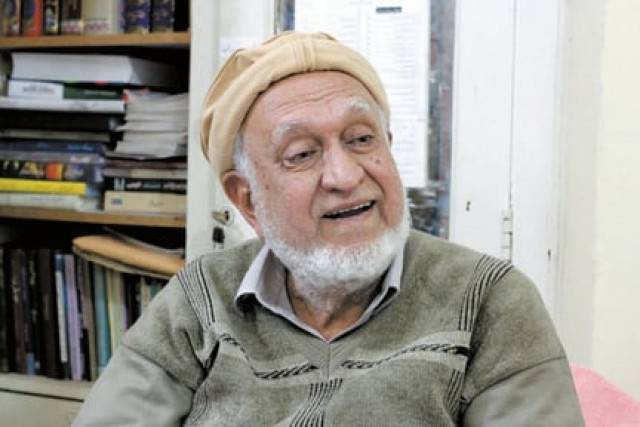An inside look: The unwritten stories of Jamaat-e-Islami
Book on party's history is expected to be finished within a year

Surrounded by newsletters, books, newspaper clippings and different publications of the party, Mehboob Alam Siddiqui, clad in an Afghan Pakol (Peshawari cap), recalls how one of his colleagues at Radio Pakistan introduced him to the president of Islami Jamiat Talaba, Karachi University in 1969. PHOTO: AYESHA MIR/ EXPRESS
Mehmood Alam Siddiqui, a follower of JI, was disheartened after the 1970 elections when the party claimed they will win with at least 70 seats but ended up winning only four seats in the National Assembly.
Siddiqui's elder brother, who was financially supporting the family, died while he was in his final year of Master's in Business Administration. "A friend of mine whose father was affiliated with Radio Pakistan helped me get a part time job in Radio Pakistan as a translator so I could meet the expenses for my studies," recalls Siddiqui while sitting in a small room at JI headquarters.
Surrounded by newsletters, books, newspaper clippings and different publications of the party, Siddiqui, an elderly man with white hair and a beard, wearing an Afghan Pakol (Peshawari cap), recalled how one of his colleagues at Radio Pakistan introduced him to the president of Islami Jamiat Talaba (IJT), Karachi University in 1969.
Jamaat-e-Islami sold leased plot illegally, PAC informed
In his student life, Siddiqui was inspired by JI founder Maulana Abul A'la Maududi and that is why he had a soft corner for the party. "I always liked the party's agenda but the claims in the 1970 elections and the subsequent results discouraged me. The last nail in the coffin was the by-elections after separation of East Pakistan," Siddiqui said, adding that he felt the by-elections were rigged.
After that he distanced himself from JI and IJT until 2009 when he was asked to write a script for a documentary on the history of JI. "I was keenly inspired by Maulana Maududi and was part of a project of a short film on his life after which I was approached to work on a documentary on JI," he informed. He joined JI as a member in 2012 while he was working on putting down its history.
After distancing himself from the party, Siddiqui worked in an advertising agency for one year and in 1973 started his own export company, which was not successful for a long time.
Police round up JI workers after clash
After he met with an accident in 1991, Siddiqui gave up his export business and started working for various advertising agencies. Siddiqui also has some feathers in his cap for giving the country some famous jingles. Other than that, he had been writing columns in newspapers too.
When Siddiqui was asked to write the script, he pointed out that he was not familiar with the party's history and before making a documentary there was a dire need to compile JI's history since its inception in 1941.
And so, the struggle to compile the party's past started by going through books from old offices to the personal libraries of the workers and leaders. "We have conducted hundreds of interviews on telephone, email and video calls in the last eight years," Siddiqui told The Express Tribune, adding he had also travelled to Punjab many times to get personal accounts of the people associated with JI and pen down their memories of the party's initial days.
Jamaat rallies: Storm of protests over Molla’s hanging
The most difficult part of compiling the history was to ask for personal writings and collections from people, said Siddiqui. "We had to request people for photocopies of old pictures and speeches, but many denied sharing the data," he added.
Almost complete
From the five leaders of the party, the eras of two leaders have so far been compiled and completed in the shape of a book while work on the era of Qazi Hussain Ahmed is also near completion. "The eras of Maulana Maududi and Mian Tufail Mohammad have been completed," he said, adding that they have also started working on the tenures of Munawwar Hasan and Sirajul Haq. The work on JI's history is expected to be finished within a year, he said.



















COMMENTS
Comments are moderated and generally will be posted if they are on-topic and not abusive.
For more information, please see our Comments FAQ